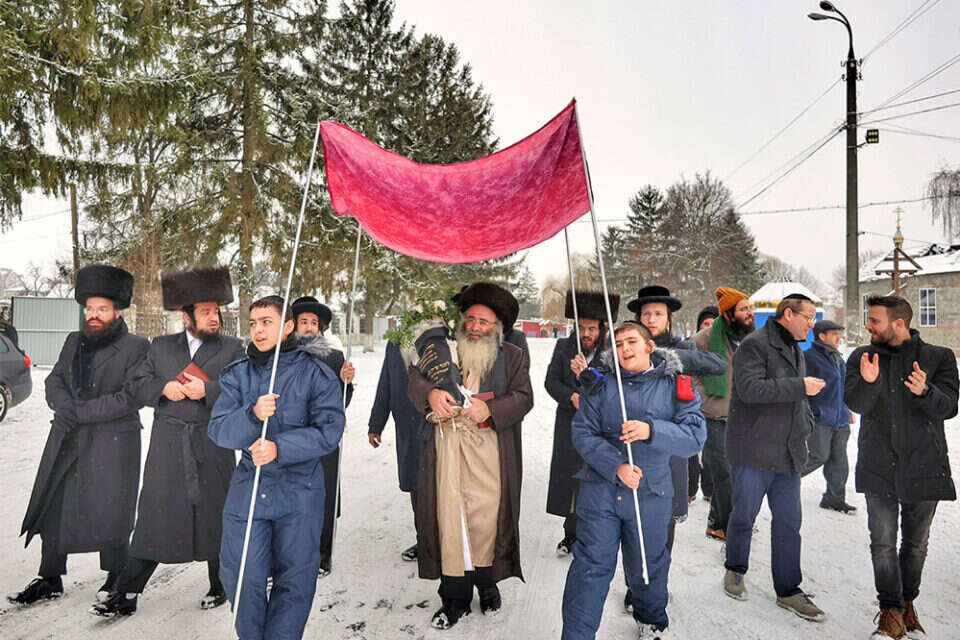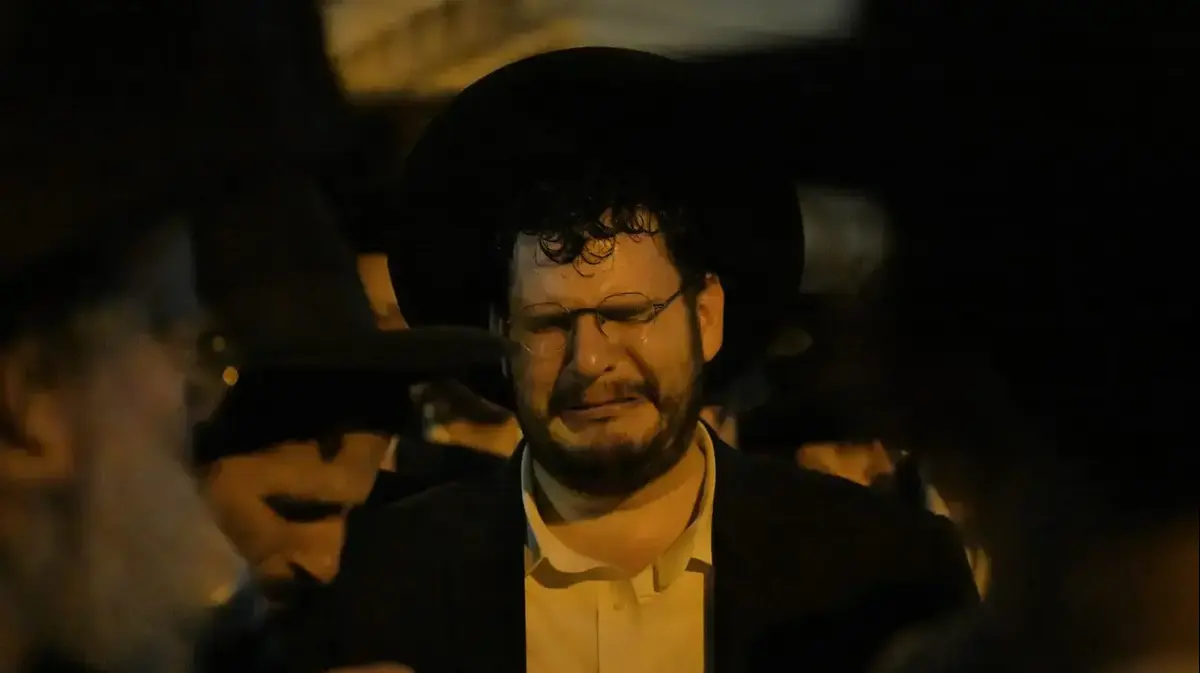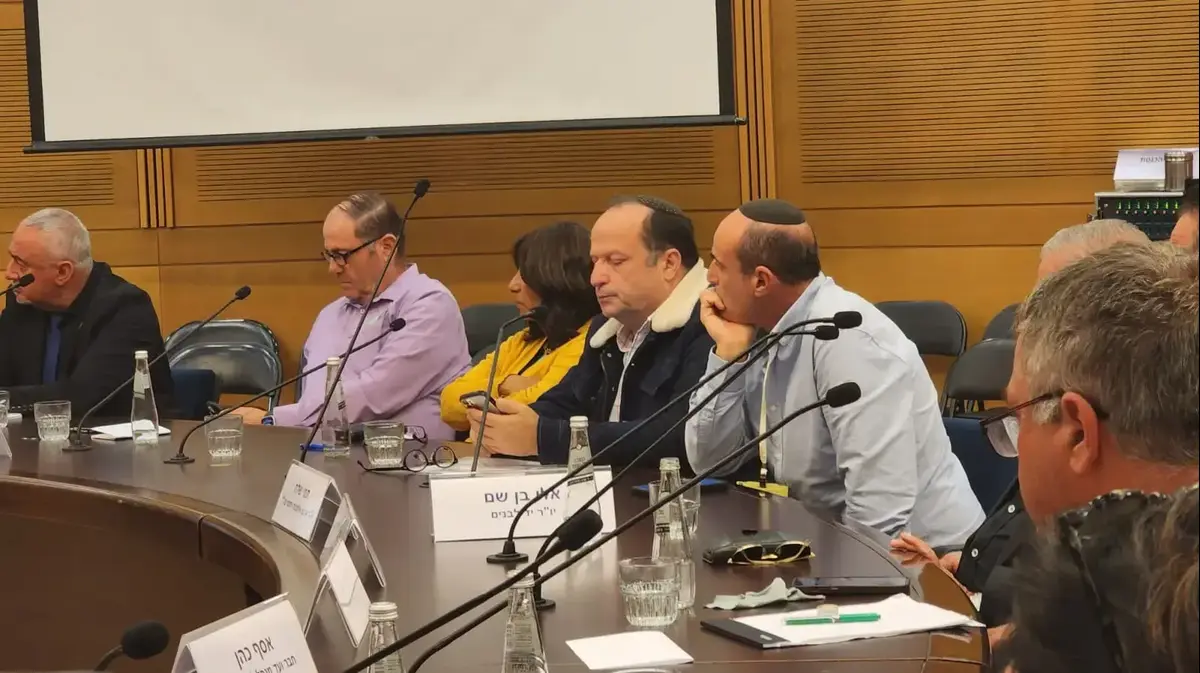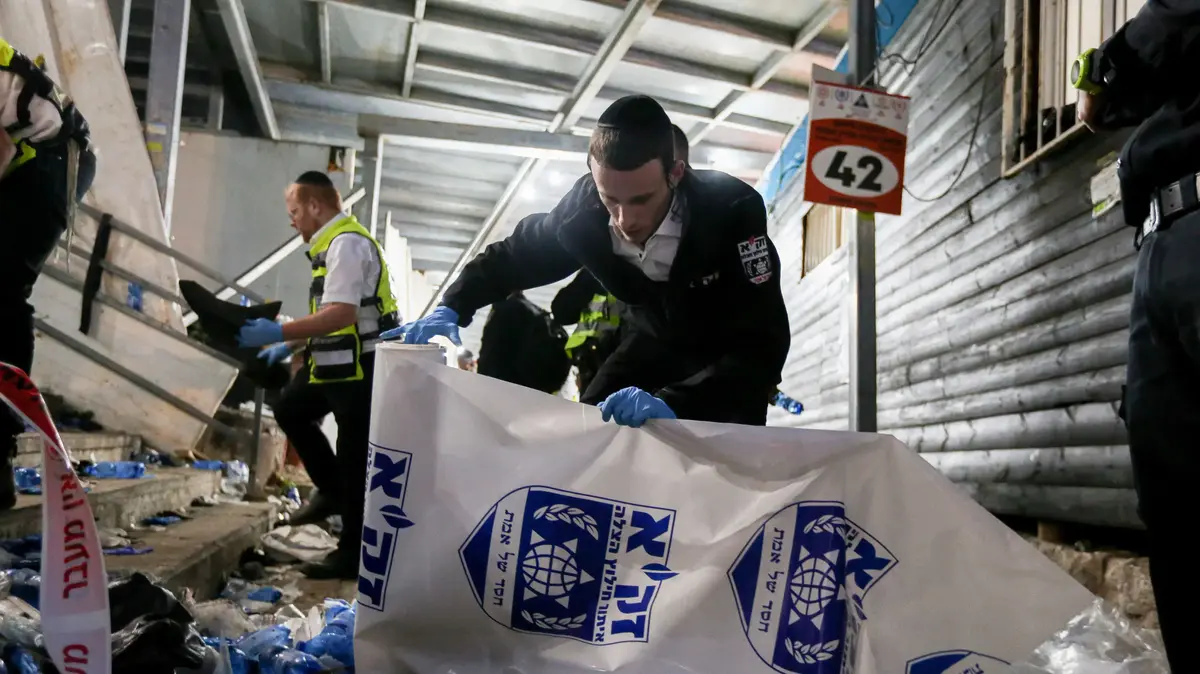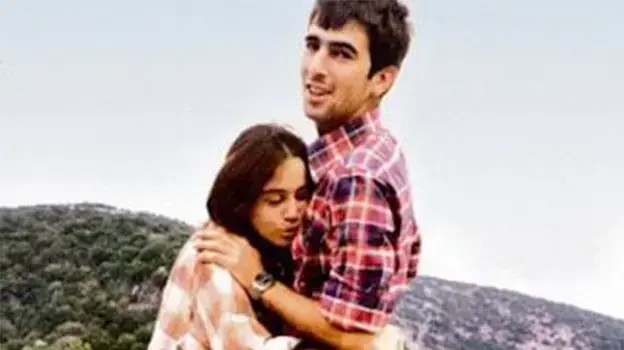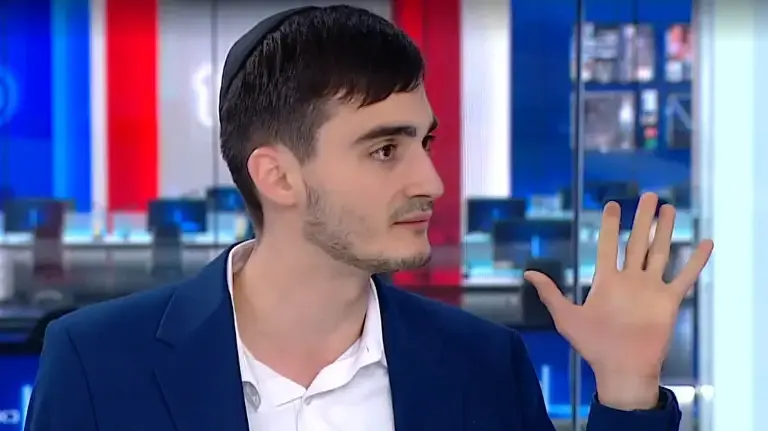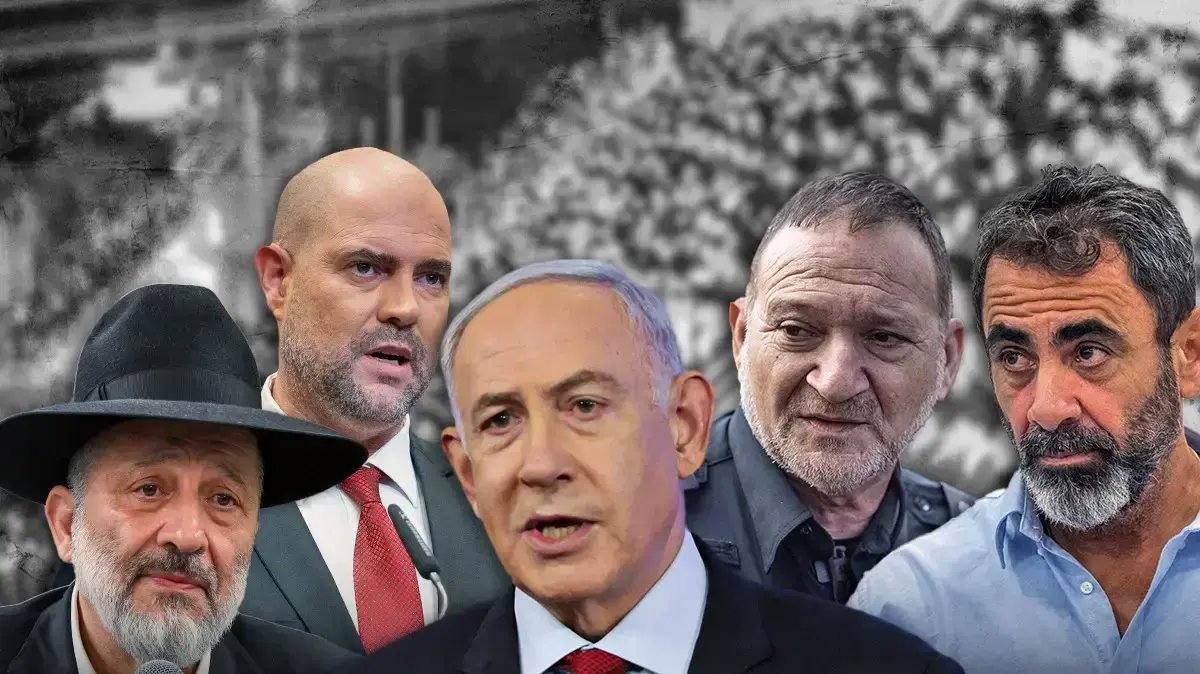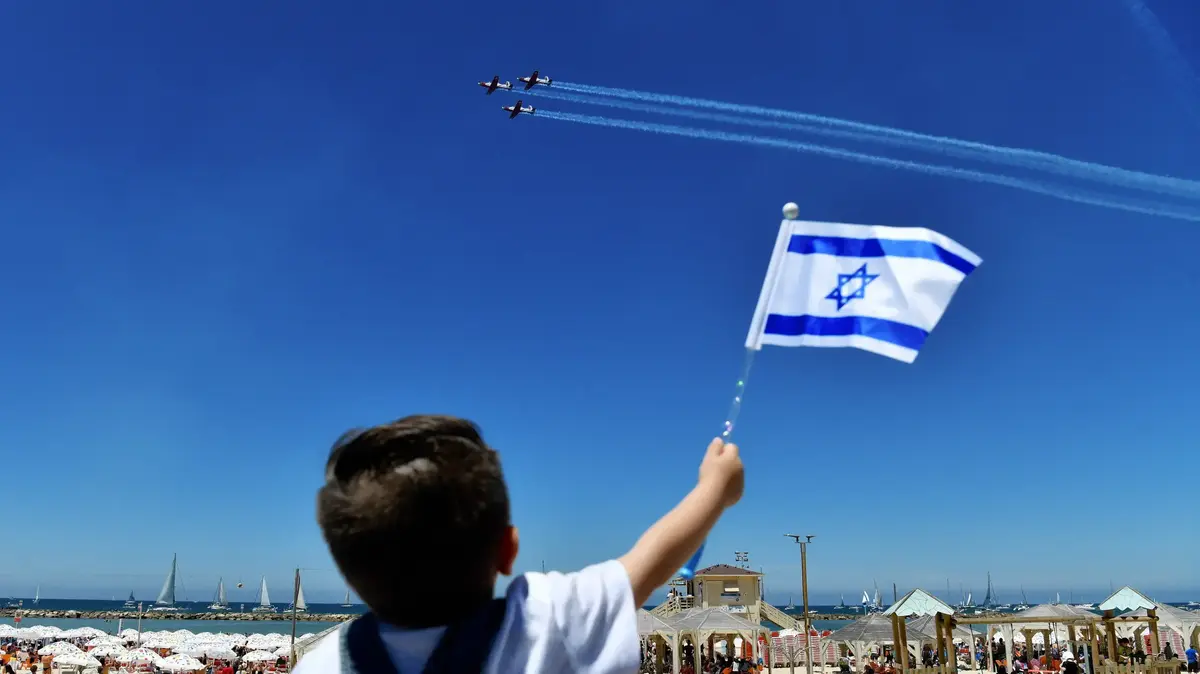Wednesday, December 22, early in the morning.
Ben-Gurion Airport is almost empty of people, after the United States and many European countries entered the red list courtesy of the Corona.
But near one of the entrance gates there is a lively traffic.
More and more people are gathering there, waiting for the opening of the counters of the Ukrainian airline.
These are the families of the victims of the disaster in Meron, who are gathering for a journey they have been waiting for a long time - prostrating on the graves of the righteous in Ukraine.
A journey that takes place a few weeks before the tensions with Russia, which brought war winds to the snowy country.
They are here, all the names remembered from the blood letters of disaster.
Rabbi Avigdor Hayut (37) from Bnei Brak, who lost his son Yedidya and his student Moishe Levy, 13;
Shimon Elhadad (29) and his father Rabbi Meir Nachman Elhadad (52) from Jerusalem, who lost his sons Moshe Mordechai, 12, and Yosef David, 18;
Four of the Diskind brothers - Pini (20), Israel (27), David (31) and Hanoch (33), who lost their 23-year-old brother Simcha Bunim;
Shlomo Rak, 44, of Beit Shemesh, who lost his 18-year-old son Chaim;
Yosef and Ziona Matalon, who lost their son Shimon, and his widow Rachel Matalon (37);
Nehemiah Rubin (28) from Beit Shemesh, the widow of Yehuda and the mother of Jonathan, who was 4 years old when he said Kaddish about his father's grave and moved an entire country.
More and more orphans, widows, bereaved parents.
They are meeting for the first time in a long time, to embark on a journey that may comfort their wounded souls, after eight months of torment since the disaster at the Rashbi tomb in April last year. The trip was initiated by Israel Diskind and Shimon Elhadad, the bereaved brothers 5741 "for the commemoration of the dead and for assisting families.
The two recruited Rabbi Moshe Landau, a wealthy ultra-Orthodox from New York, who funded the journey and the writing of a Torah scroll for the souls of those who perished.
Four hours later - Boryspil airport in Kiev.
Leaving the terminal for the freezing cold, minus 11, and for a blanket of snow that envelops everything.
Despite countless layers, coats and gloves, the cold penetrates the bones.
The bus of the "Artist Express" company, whose name is smeared on it in Hebrew, is already waiting for us.
Group members are organizing for a brisk ascent to find shelter from the cold.
One of them is carrying a huge metal box, inside which is an organ.
"I am supposed to play here at the introduction of the Torah scroll this coming Friday," he says, "and I am the brother of one of the victims."
His name is Nachman Cohen, he is 20 years old from Beitar Illit, and in Meron he married his brother Eliyahu Shmuel, who was 16 at the time of his death.
In front of me on the bus, Avigdor Hayut and David Levy are sitting next to each other, with their children sitting in the nearby chairs.
Throughout the journey they will be together.
A blood bond was forged between them, after Avigdor took with him to Meron David's son, Moishe, along with his own son Yedidya.
Both, Moishe and her friends, perished in the disaster.
Rabbi Meir Nachman Elhadad from Jerusalem, a Breslav follower with experience in guiding groups in the tombs of the righteous in Ukraine, takes the lead in the journey.
For many of the participants, this is their first trip abroad. Such are for example David Levy and his three children, who never left the country. Now, when the opportunity came to vent some of the feelings on the graves of the righteous, they could not refuse.
The scene of the disaster on Mount Meron, a day later, Photo: David Cohen / Ginny
• • •
The road is long, not easy.
In the next few days it will become clear that each grave in the journey plan is three to four hours away from the one that follows.
Considering that Ukraine is laden with snow and that some of the roads are covered with a layer of ice, the journeys become very long.
Two and a half hours after the start of the trip, surprise: in the middle of nowhere - a kosher cafe, established here due to the demand of passengers for Uman.
It offers kosher sandwiches and pastries, falafel, pizza, and even Bamba and Beasley and other Israeli snacks.
The coffins in the place are full of holy books, which travelers have left for those who will come there after them, so that they can study or pray.
At one of the tables sits Avraham Levy, who lost his 17-year-old brother Yosef.
Beside him are two of his brothers-in-law, David Vazana (29) and Yosef Chaim Hazan (25), who are married to Yosef's sisters.
They open the meal bag and allow themselves to release a statement of black humor.
"Hard-boiled egg ... did you notice that they prepared mourning food for us, yes?".
After dinner, the children in the group jump and play in the snow outside.
The friends are photographed against the background of the huge sign in Hebrew "Kosher Cafe", and everyone is in a hurry to get on the bus and escape the cold.
Another hour passes, and we are before entering the artist.
Rabbi Elhadad, who has been commemorating Rabbi Nachman for more than 30 years, even before the fall of the Iron Curtain, wants to put the families in the right mood.
"We are now going to Rabbi Nachman, the great Menachem," he says into the microphone.
"Almost everyone who is on this bus experienced a big break eight months ago. The soul needs to be healed and comforted, and Nachman is a name of comfort. Of his actions.
"It's so important that we gathered here together for this special journey. God has gathered us into one family.
We became one family, in-laws.
Just as Gd chose these 45 souls for Him, He chose to unite the souls of all their families. Already when He created the world, Gd expected Him to take 45 souls from the people of Israel to atone for the people of Israel.
"Everything according to the plan that has existed for more than six days in the beginning, only ours did not discover it, and it continues to exist during the days of our lives."
The women in the group, the widows and bereaved mothers, cover their faces with their hands, in tears.
Until now they have dealt with the technical part of the journey - the flight, the journey, the meal.
Now, in a few minutes of speaking, Elhadad touched them deeply.
Not as another rabbi talking about the disaster, but as someone who has personally experienced the terrible loss of his two children.
"We are emissaries of the people of Israel," Elhadad continues, with the first "Uman" sign on the right of the road.
"We are a large group of broken hearts, and anyone who has a broken heart, surely God hears his prayer."
"The Great Comforter."
The bereaved families are praying at the tomb of Rabbi Nachman Bauman, Photo: David Keshet and Yishai Yerushalmi
• • •
The temperature in Uman is even lower than in Kiev, minus 12 degrees, and the snow envelops the place.
We stop near the Hoshen Hotel, which is considered to be of the highest standard of all hotels in Uman.
Even a heated hope is here.
After receiving the rooms go out to mark the tomb, a five minute walk away.
The main street, Pushkina Street, is full of a variety of Jewish shops and kosher restaurants.
At any moment, another local stops us, asking in Hebrew if we should "spend money" or "buy a SIM."
Rabbi Nachman's Zion does not currently have many worshipers.
This is not the holiday season, when it is not possible to put a pin here, but there are some local Jews who come to pray.
At the entrance we are given pamphlets with the "General Tikkun", the ten chapters of Psalms that Rabbi Nachman used to say for virtue and prayer.
Each member of the family takes a booklet, prays and places his hand on the score, asking for a blessing.
These are very personal moments.
Before the evening prayer comes Yosef Chaim Sitbon (31), son-in-law of Rabbi Moshe Tzarfati who perished in Meron, and distributes a special prayer composed by his father-in-law, which speaks of the unity and love of Israel.
"Let in our hearts to love every Jew and see right in every Jew, that we hear and talk about everyone only the good," it read.
The group concentrates on Arabic prayer, men and women separately.
During the prayer spell, quite a few sighs are heard from the worshipers, and at the end a heartbreaking spectacle takes place: almost everyone, orphans and bereaved parents, say Kaddish together.
Led the journey.
Rabbi Meir Nachman Elhadad in the tomb of Rabbi Nachman, lighting candles to lift the souls of those who perished, Photo: Photo: David Keshet and Vichy Yerushalmi
The way back to the hotel I do with the four Diskind brothers.
Enoch, Pini and David belong to Gur Hasidism.
Israel has left storks in recent years, converting them into a black knitted cap.
But it seems that despite the differences in dress, and perhaps also in opinions, the disaster brought them closer.
In the evening the men sit down at one table, the women at the next table.
We begin to sing, and it is not appropriate to open with a song written according to the words of Rabbi Nachman: "And even in the concealment within the concealment, surely there also God is blessed."
It is the song that accompanied them even in the difficult hours, and helped them hold on to faith with all their hearts.
Then they sing another chilling song, "Have mercy on your people," a chassidic song sung by the late Shragi Gashtner, a Chassidic singer from New York who perished in Meron, and he is 36. This song has become identified with the disaster, Sons, may God have mercy on us, and save us for your name's sake.
Compassion, have mercy on your people.
Have mercy, have mercy on your property.
"Please, have mercy on us, have mercy on our King and answer."
At the end of the meal the atmosphere warms up, and everyone bursts into a chassidic dance around the table.
After all, it's a time of hope.
• • •
The next day we make our way to the town of Berdychiv, where Rabbi Levi Yitzchak, who has been nicknamed the "Advocate of Israel," is buried.
On the long journey - three hours on a normal day, four on a snowy day and almost five on a bus that travels slowly due to the slippery roads - I meet Yeshayahu Fogel (64) from Jerusalem, the father of the late Yedidya, who perished in Meron at the age of 22.
Four years ago, Isaiah lost his wife, Rachel, 58, who died of cancer on her birthday.
Now he is trying to cheer up, and draw some strength from the righteous and the journey partners.
"A few days before Rosh Hashanah, I called some of the families to wish them a happy new year," he says.
"In the family of the late Doron Chen, one of those who perished in the disaster, I was told that his father, Moshe, fell ill in Corona and was hospitalized in a very serious condition.
On New Year's Eve he passed away.
"Rabbi Shalom Seller, the father of the late Chaim Seller, who was killed in Meron, also died in Corona in recent days."
Mali Seller, Haim's widow, is with us on the bus.
"My father-in-law is not really dead now," she says painfully.
"Although his soul left a few days ago, he already died on Lag B'Omer, together with his son, my husband.
He received the disaster in a severe way and his body weakened greatly, until he could no longer stand it. "
As you approach the town, a singing bus starts.
Rachel Matalon (37), the widow of the late Shimon, a magnet department with empowerment sentences written by her husband, which were found after his death. Shimon, a father of eight, was a veteran teacher at Hyder in the city of Beitar. He educated children for 13 years.
"The things he wrote were his motto," she says.
"He exchanged a few drafts until he distilled these sentences. All these years he was a man of Meron, in the full sense of the word. He was connected to Rabbi Shimon Bar Yochai in every vein of his soul, and was also named after the Tzaddik For another child. "
Nehemiah Rubin, 28, the widow of the late Yehuda, joins the conversation. Her husband, she says, began teaching after he was a student, but wanted to increase the family's income.
"I think what all those who perished in Meron had in common was that they were all people and children full of heart and soul," she says.
"We talked a lot among ourselves, all the widows, and we noticed that what all the dead have in common is acceptance of the other and love for the other. Degrees between a man and his friend. My husband, for example, in life was not one of the pushers. He would not save himself by trampling other people."
Bezalel, one of the three children of Nehemiah and Judah, will mark the age of 3 shortly before the upcoming Lag B'Omer, and she is still debating whether to take him to the merriment in Meron, if it takes place. "I did not visit there after the disaster.
"I passed an area once with relatives and thought of entering, but at the last minute I told the driver 'do not enter, I can not'".
How do children cope with the loss?
"It's hard for them. Dad they miss everything. Sometimes they ask 'Where' Dad? '. It's a hole in life. He's missing, but we remember him, the children see his pictures, and he's present in our lives. A few days ago, Jonathan son 5, who said of him the Kaddish at the funeral, came home and said that friends asked him where his father was. He told them that his father had died, and they said to him: 'What a poor you are.' I told him: 'You are not poor.
"Exalted Journey."
Nehemiah Rubin (on the left) with her sister (in the white coat) at the tomb of Rabbi Levi Yitzchak of Berdichev, Photo: David Keshet and Vichy Yerushalmi
• • •
The bus enters the town gates and drops us off at the entrance to the cemetery where Rabbi Levi Yitzchak is buried.
A cold of minus 13 degrees greets us, this time also with winds, but no one misses the visit to mark the tomb.
As in Rabbi Nachman's Zion, here too everyone says together the prayer composed by the late Rabbi Tzarfati for the unity of the people of Israel.
We continue to Mzibuz, perhaps the most famous town in the stories of the Hasidim, where the Baal Shem Tov, the founder of the Hasidic movement (and Rabbi Nachman's great-grandfather), lived and worked, whose disciples were all his disciples buried in Ukraine.
We arrive at the venue in the evening, and the group draws looks from all sides.
"Is this the group of Meron families?", Some of the visitors to the place ask me.
It turns out that the rumor about the trip has made her wings since we left the country, and photos taken by people who encountered us on the way have made their way to the ultra-Orthodox WhatsApp groups and the popular Twitter accounts of the sector.
After the meal we enter the tomb of Baal Shem Tov and discover that the place is indeed crowded with worshipers, most of them secular who came from Israel - mostly women, who now pass notes with names into the hands of men, so that they can pray for salvation.
Some beg Rabbi Elhadad "Pray for them for a decent marriage!", And he responds.
Each member of the group gathers for a silent prayer.
Pini Diskind pulls out a guitar, and people join him in singing, wiping away a tear.
• • •
Despite the late hour, we continue our journey towards the tomb of the next Tzaddik, which is in Bampil.
In this town lived until the time, until before the Holocaust, an important Jewish community, which grew well-known rabbis.
About 250 years ago, one of the greatest Hasidic scholars, Rabbi Yechiel Michal Mazlotshov, worked there, buried there.
In the morning we gather for morning prayer in the synagogue hall of the hotel we arrived at night.
In a few hours, the introduction of the Torah scroll written for the upliftment of the souls of those killed in Meron will be held here, and already everyone is excited to see the new curtain placed over the ark, on which the 45 names are embroidered.
Three hours later we meet again in the synagogue.
The WhatsApp group of the trip asks if there is a scribe among the passengers, referring to the scribe Stam, for the purpose of completing the last letters in the new Torah scroll. , He devotes an hour to refilling ink with the last letters of the Torah scroll.The rest of the men join him, after he instructs them what to do, as a virtue for them.
When the writing is over, the exciting climax of the journey arrives: the introduction of the Torah scroll.
Nachman Cohen takes out the organ and plays chassidic songs, Pini Diskind accompanies him with singing, and all the men shake hands and form a large dance circle.
While dancing, the little Torah scroll passes from hand to hand, and everyone gets a few minutes to dance with him in the center of the circle.
Joy mixed with sadness.
The dances after the introduction of the Torah scroll in the Bampil Synagogue, Photo: David Keshet and Vichy Yerushalmi
In the midst of the joy, Pini signals something to Nachman, which slows down the tempo a bit.
The two begin to sing, over and over again, the words "In honor of the divine Tanna Rabbi Shimon Bar Yochai!"
- The same song that was played in Meron while their loved ones were killed.
The song that was repeatedly stopped by the cries "Rescue! Paramedics!".
To the sound of this song they are dancing here now, and it is flooding them all over again.
Some choose to leave the circle, unable to sing the song when the memories rise.
I also do not stand the load and move aside with teary eyes.
But Pini does not stop.
He will then explain to me that he knew that he must sing these songs, so that the families would not attribute them to the disaster, but also to the joy of bringing the Torah scroll.
Then we go out with the Torah scroll, which is led under a canopy in a procession towards the Rebbe Zion Yechiel Mazlotshov.
Rabbi Elhadad explains that when troubles occur to the people of Israel, it is a virtue to bring a Torah scroll to a cemetery by widows and orphans who have experienced disasters, so that they can pray for the people.
The local Ukrainians look in bewilderment at the uncharacteristic procession of Jews.
Shlomo Rak, the father of the late Haim, who perished in Meron when he was 18, points to passersby and tells me: "They do not understand what is going on here, since when do they go dancing towards a cemetery?".
When it comes to the Zion of the Tzaddik, the families begin by reciting Psalms and prayers.
The book will later be placed in the hotel's synagogue, where it will be kept in the Holy Ark.
Rabbi Avigdor Hayut, who lost his son and student in the disaster, at the introduction of the Torah scroll in the town of Yampil, Photo: David Keshet and Yishai Yerushalmi
• • •
On Saturday afternoons, several members of the family gather in the lobby to pour out their hearts.
Shmuel Elhadad (20) from Beitar Illit, the brother of the late Yosef David and Moshe Mordechai, says that his eldest son was born recently, and he chose to call him Yosef David.
For the first time in the journey they talk about the failures that were in Meron that day.
Some of them resent the conduct of the Institute of Forensic Medicine in Abu Kabir the day after the disaster, Friday, and the delay in releasing the bodies for funerals.
Rabbi Meir Elhadad says he was summoned to the state commission of inquiry but postponed his visit for a few weeks, to look for more findings that would strengthen his claims about the conduct of the police and the other bodies involved in the incident.
Since then he has had time to testify before the committee, presenting all his allegations in detail.
"In the days after the disaster, I received a surprising phone call from a Border Police officer," he says.
.
On Sunday, just before the flight to Israel, we are enough to visit a few more tombs of the righteous.
The family members carry last prayers, and are especially directed that we will never know of another such disaster.
"It was an uplifting journey," Nachmi Rubin is excited.
"He introduced me to my families and my widowed friends, and the common pain connected us. There were moving moments, and there were many prayers. Praying in the graves of great righteous people is something that gives hope, strength and comfort."
Chananibl2@gmail.com
Were we wrong?
Fixed!
If you found an error in the article, we'll be happy for you to share it with us

